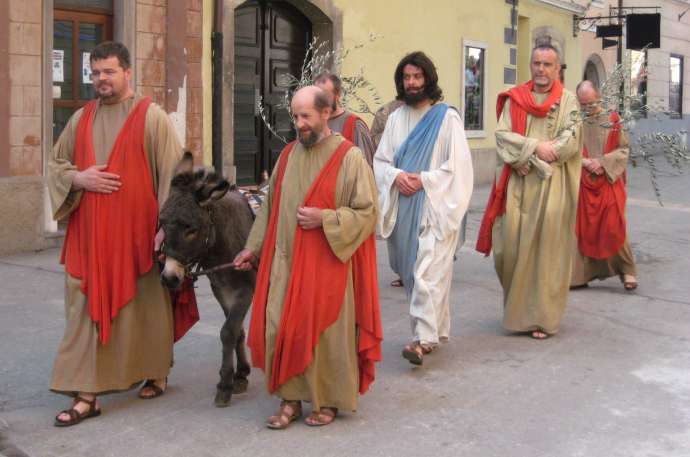STA, 2 April 2021 - The Škofja Loka Passion Play, Slovenia's oldest play, was staged in the town of Škofja Loka on Good Friday exactly 300 years ago. Passion processions had been held in town before and the play was in the making for years, but the preserved manuscript is dated 1721.
The 300th anniversary of the oldest preserved play in Slovenian and the oldest preserved director's book in Europe was to be celebrated with the staging of the play but the mass event was pushed to 2022 because of the epidemic.
The Škofja Loka Passion Play is the biggest play staged outdoors in Slovenia featuring around 1,000 volunteers.
It is difficult to say for certain when it was written down, "but we know that it was in the time when father Romuald lived in the Škofja Loka Capuchin monastery, meaning between 1715 and 1727," coordinator of the Škofja Loka Passion Play Agata Pavlovec told the STA.
"One performance definitely took place on Good Friday in 1721," she said, adding that the preserved director's book carried that year and that passion plays had been staged every year only on Good Friday.
In modern times the play was revived, and has been staged every six years since. Usually it is performed eight times during Lent and before Easter.
According to Matija Ogrin, a literary historian who presented the historical context of the play in this year's scientific publication dealing with the Škofja Loka Passion Play, there are many variants of the Capuchin passion play and passages dating back to the 17th century.
They started to emerge soon after the Order of Friars Minor Capuchin came to Ljubljana in 1606 and introduced passion processions on Good Friday there.
"This means that until the passion play started to be staged in Škofja Loka there was an almost a 100-year tradition of passion play texts in a number of versions, additional scenes, dialogues etc.," said Ogrin.
Any leader of the procession, for example in Radgona, Villach and Škofja Loka, where they were being staged, had access to these texts within the Capuchin order.
When father Romuald was writing his text for the procession in 1715 he used previous versions of Capuchin processions.
There is evidence that passion plays had been staged in Škofja Loka from 1713 until a ban in 1768. The literary text by father Romuald was written and supplemented between 1715 to 1727, Ogrin said.
Out of all Capuchin passion plays only the Škofja Loka Passion Play has stood the test of time.
The original book, which underwent restoration last year, is kept at the Škofja Loka Capuchin monastery, where it was written.
The Škofja Loka Passion Play was first staged in modern times in 1936, and then in 1999, 2000, 2009 and in 2015.
Next year, it will be put on for the first time since it was listed on UNESCO's representative list of intangible cultural heritage in 2016.
The play is performed by amateur actors and the spoken text is accompanied by music and singing. The performance features cavalry, men who carry crosses, whippers, Adam's children, colourful fraternities and guilds, musicians and singers.
Around 900 performers and 400 support staff take part and they are all volunteers, reads UNESCO's description of the play.
This year, Škofja Loka will mark the tricentennial with several on-site and virtual events dedicated to the play and its heritage, including several exhibitions and screenings of the play.
The town was also to host the annual conference of the European towns with the tradition of passion plays, Europassion, which unites almost 90 passion groups from 16 countries, but the event was cancelled due to the pandemic.







